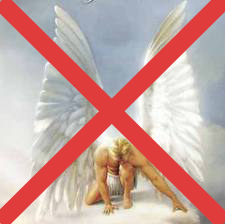In those days I was reading a book by Rupert Sheldrake, an English biochemist, plant physiologist (and, perhaps, pataphysicist1): The Physics of Angels: Exploring the Realm Where Science and Spirit Meet (San Francisco, CA: HarperSanFrancisco, 1996).
The fact that I was then trying to find a scientific foundation for things spiritual may have been the major reason that about ten years later I abandoned believing (or attempting to believe) in angels (and gods).
But I still, from force of habit, count "angel-one, angel-two," and I do so even though I've made some effort (admittedly half-hearted) to switch over to "Darwin-one, Darwin-two."
I've decided I don't mind. It is a fact of my life that I need to honor that for many years I believed in angels (or, at any rate, tried to do so). And counting "angel-one, angel-two" always reminds me of another fact I honor more: I concluded that there aren't any angels (or any other supernatural beings) to believe in.
_______________
- Or pataphysician; see comments on "A most extraordinary mathematical proof."

I've heard of one-mississippi, two-mississippi, but angel-one, angel-two, is a new one.
ReplyDeleteAnd I'd never heard of one-Mississippi, two-Mississippi. Do some people you know really count seconds that way? "Mississippi" has so many syllables, I'd think there'd be quite an art to saying them fast enough to cram into a single second. Of course, if it's Southerners who count that way, they'd probably pronounce it "one-Mis-sip, two-Mis-sip"?
ReplyDeleteI'm a little encouraged, though, that you'd never heard of angel-one, angel-two, which might indicate that it could indeed have been a trademarkable feature of my erstwhile but otherwise fabulous speaking career.
By the way: <chortle>
Also, I noted the different placement of "one" and "two" in your one-Mississippi, two-Mississippi (before "Mississippi" rather than after). I have noticed that in the "usual" way of counting with "thousand," many other people say "one-thousand, two-thousand" rather than "thousand-one, thousand-two," as was my own practice. Is it more "standard," do you think, to put the number in front of whatever filler word is used than after it?
ReplyDeleteI used the thousand method, but like this. One thousand-one, one thousand-two, etc. Perhaps my time is slower or I said it faster (grin).
ReplyDeleteYou sly dog, Steve, having the filler word both before and after a number!
ReplyDeleteBut you're right about there being enough time. When I say "angel-one," I throw a little hesitation in there to round out the second of time! "angel-o-ne, angel-tw-o, angel-th-ree..."
And maybe "one-Mississippi" would work just fine, even in the mouth of a Yankee!